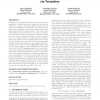Free Online Productivity Tools
i2Speak
i2Symbol
i2OCR
iTex2Img
iWeb2Print
iWeb2Shot
i2Type
iPdf2Split
iPdf2Merge
i2Bopomofo
i2Arabic
i2Style
i2Image
i2PDF
iLatex2Rtf
Sci2ools
131
click to vote
WWW
2011
ACM
2011
ACM
Improving recommendation for long-tail queries via templates
The ability to aggregate huge volumes of queries over a large population of users allows search engines to build precise models for a variety of query-assistance features such as query recommendation, correction, etc. Yet, no matter how much data is aggregated, the long-tail distribution implies that a large fraction of queries are rare. As a result, most query assistance services perform poorly or are not even triggered on long-tail queries. We propose a method to extend the reach of query assistance techniques (and in particular query recommendation) to long-tail queries by reasoning about rules between query templates rather than individual query transitions, as currently done in query-flow graph models. As a simple example, if we recognize that ‘Montezuma’ is a city in the rare query “Montezuma surf” and if the rule ‘<city> surf → <city> beach’ has been observed, we are able to offer “Montezuma beach” as a recommendation, even if the two queries wer...
| Added | 15 May 2011 |
| Updated | 15 May 2011 |
| Type | Journal |
| Year | 2011 |
| Where | WWW |
| Authors | Idan Szpektor, Aristides Gionis, Yoelle Maarek |
Comments (0)

